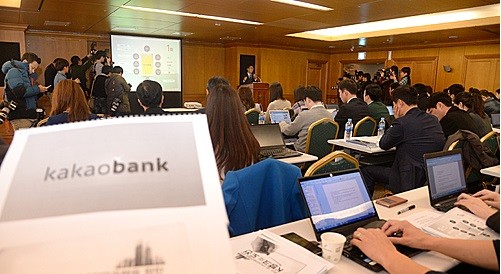
[Special Economy=Eunji Kim]Now that the selection to become Korea's very first "internet bank" is finalized, how the services offered by the chosen consortiums will differ is brought to light.
Both Kakao Bank and K-Bank say they will present customer-based financial services but for one, the latter bank is emphasizing offline accessibility.
Called "ubiquitious finance," K-Bank will make it possible for customers to conduct financial deals at public telephone stations, convenience stores and cell phone stores. It's promising to become an internet bank, which is different from "online banking," that exists near your home, anywhere.
Additionally, the daily wireless bills can be deducted from the bank interest rate. That means the money obtained from the bank's interest can be used toward the wireless bills, making these tabs cheaper.
And, the same can be applied to free data services, music or VOD contents.
Through "robo-advisors," K-bank will inform customers of which investment plans to have according to their needs.
On the other hand, Kakao Bank is placing importance on mobile accessibility through smartphone messengers.
Kakao Bank will use the popular messenger app, Kakaotalk, to conduct wire transfers, payments, and loans. For example, one can use a public messenger chat room to manage finances.
Also, the bank's "robo bot" will answer simple questions as complicated ones will be solved through consultations available 24/7.
What both Kakao Bank and K-banks will have in common is that they will have higher interest rates on deposit accounts, lower loan costs and reduced service fees.
That's because these consortiums will be able to save capital on labor and overhead costs that is required to run a regular offline bank.
These internet banks, which already are established in countries like the United States and Japan, will be launched late into next year and additional two to three more of them will be established.

